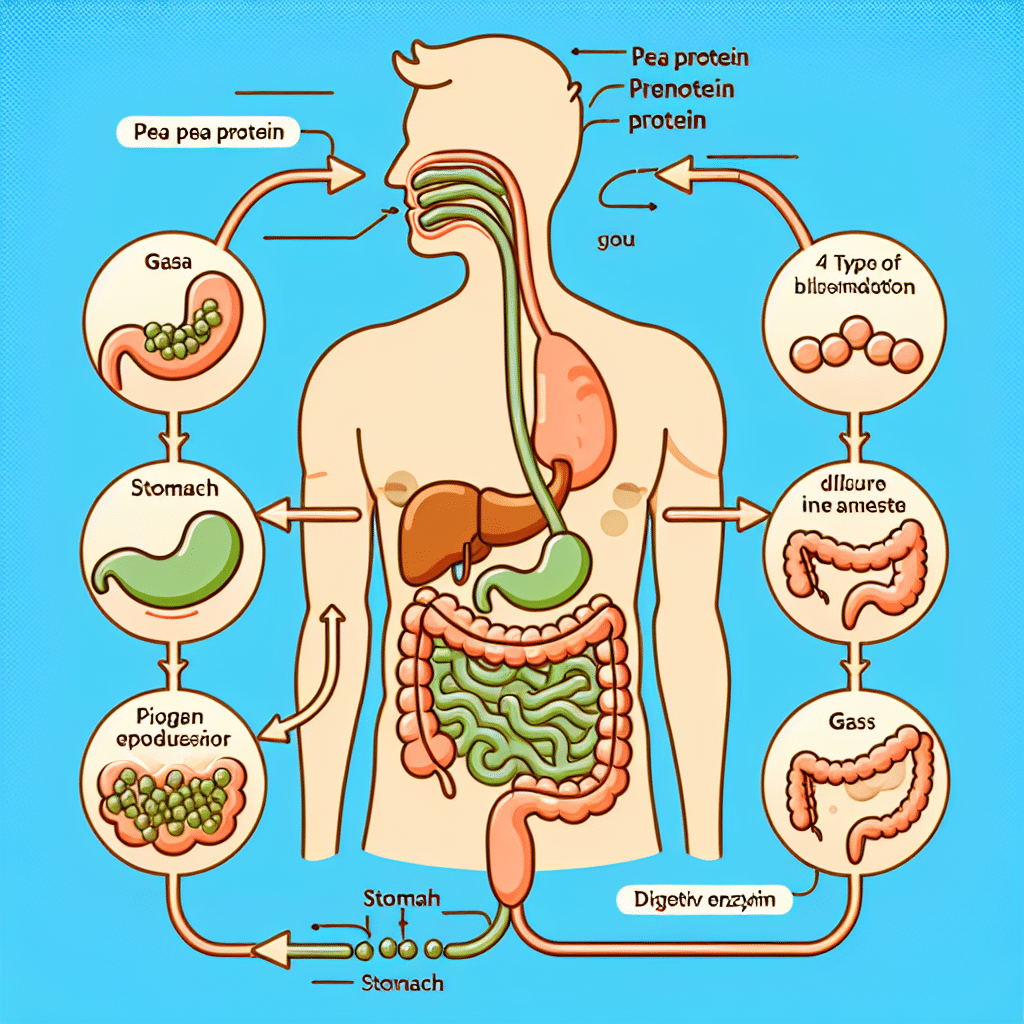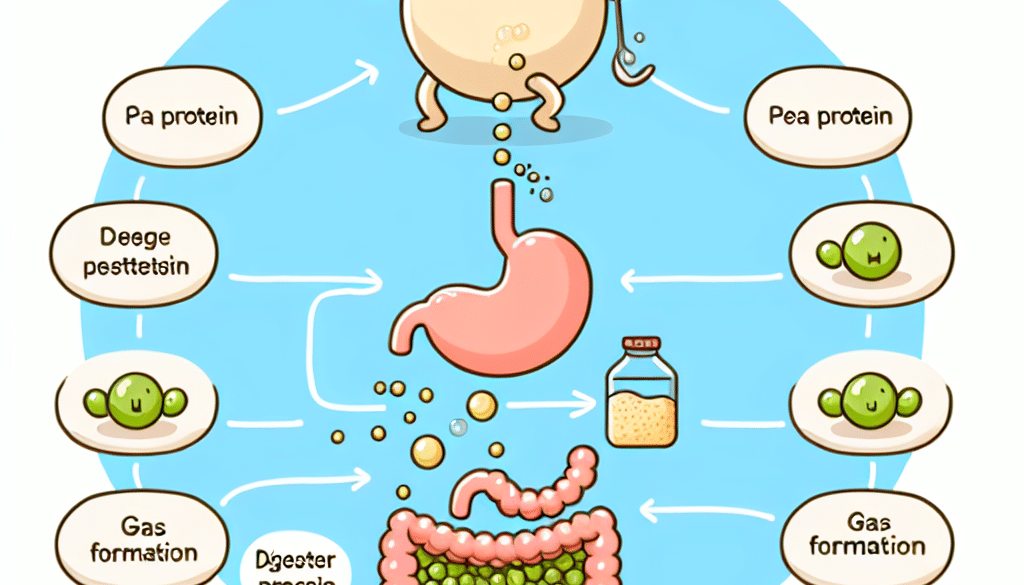Why does pea protein make me gassy?
-
Table of Contents
- Pea Protein and Digestive Discomfort: Understanding the Gassy Side Effects
- What is Pea Protein?
- The Digestive Process of Pea Protein
- Fiber Content and Its Role in Gassiness
- Complex Sugars and Oligosaccharides
- Individual Sensitivity and Digestive Health
- How to Reduce Gassiness from Pea Protein
- Case Studies and Research
- Statistics on Plant-Based Protein Consumption
- Conclusion: Balancing Benefits and Discomfort
- Discover ETprotein’s High-Quality Pea Protein Products
Pea Protein and Digestive Discomfort: Understanding the Gassy Side Effects

Pea protein has become a popular plant-based alternative to animal-derived proteins, especially among vegetarians, vegans, and those with dietary restrictions. However, some individuals find that consuming pea protein leads to an uncomfortable side effect: increased gas and bloating. This article delves into the reasons behind this digestive response and offers insights into how you can mitigate these effects while still enjoying the benefits of pea protein.
What is Pea Protein?
Pea protein is derived from yellow split peas and is a high-quality source of protein that contains all nine essential amino acids. It is commonly used in protein powders, meat substitutes, and a variety of health food products. Its popularity is due in part to its hypoallergenic properties and the fact that it is gluten-free, dairy-free, and soy-free, making it an excellent option for those with food sensitivities.
The Digestive Process of Pea Protein
Understanding how pea protein is digested can shed light on why it might cause gassiness in some individuals. When pea protein is consumed, it travels through the stomach and into the small intestine where enzymes break down the protein into amino acids. However, not all components of pea protein are easily digested. This is where the issues of gas and bloating can arise.
Fiber Content and Its Role in Gassiness
Pea protein contains both soluble and insoluble fibers. While fiber is beneficial for digestive health, it can also be a source of gas. The bacteria in the large intestine ferment the undigested carbohydrates, including fiber, which produces gas as a byproduct. This fermentation process can lead to the bloating and discomfort associated with consuming pea protein.
Complex Sugars and Oligosaccharides
Peas, like other legumes, contain complex sugars known as oligosaccharides, specifically raffinose and stachyose. These sugars are not easily broken down by the digestive enzymes in the small intestine and thus make their way to the large intestine, where they are fermented by gut bacteria. This fermentation produces gases such as hydrogen, methane, and carbon dioxide, contributing to the feeling of being gassy.
Individual Sensitivity and Digestive Health
Individual differences in digestive health and gut bacteria composition can influence how one’s body reacts to pea protein. Some people may have a higher sensitivity to the compounds in pea protein or may not have enough of the specific enzymes needed to break down oligosaccharides efficiently. Additionally, those with underlying digestive conditions such as Irritable Bowel Syndrome (IBS) may be more prone to experiencing gas and bloating.
How to Reduce Gassiness from Pea Protein
- Start with Small Amounts: If you’re new to pea protein, begin with smaller servings and gradually increase your intake to allow your digestive system to adjust.
- Enzyme Supplements: Taking enzyme supplements that contain alpha-galactosidase can help break down oligosaccharides and reduce gas production.
- Probiotics: Incorporating probiotics into your diet can improve your gut flora balance, potentially reducing gas and bloating.
- Hydration: Drinking plenty of water can help move fiber through your digestive system more smoothly, decreasing the likelihood of gas.
- Combine with Other Foods: Eating pea protein with other foods can slow down the digestive process and reduce the speed at which gases are released.
Case Studies and Research
Research on pea protein and its effects on digestion is ongoing. Some studies have shown that while pea protein can cause gassiness in some individuals, it is generally well-tolerated and can be a valuable part of a balanced diet. Case studies often highlight the importance of dietary variety and the role of individual digestive health in determining one’s reaction to pea protein.
Statistics on Plant-Based Protein Consumption
The demand for plant-based proteins, including pea protein, has been on the rise. According to market research, the global pea protein market size was valued at USD 213.1 million in 2021 and is expected to expand at a compound annual growth rate (CAGR) of 12.7% from 2022 to 2030. This growth is indicative of the increasing consumer interest in plant-based nutrition and the search for sustainable protein sources.
Conclusion: Balancing Benefits and Discomfort
While pea protein can cause gassiness in some individuals, its benefits as a plant-based protein source are significant. By understanding the digestive process and taking steps to mitigate gas production, consumers can enjoy pea protein as part of a healthy diet. It’s important to listen to your body and adjust your intake accordingly to ensure comfort and optimal nutrition.
Discover ETprotein’s High-Quality Pea Protein Products
If you’re looking for a reliable source of pea protein that minimizes digestive discomfort, consider ETprotein’s range of protein products. Their pea protein is designed with digestibility in mind, offering a neutral taste and non-GMO, allergen-free attributes. With a commitment to quality and customer satisfaction, ETprotein is an excellent choice for your protein needs.
About ETprotein:
ETprotein, a reputable protein and L-(+)-Ergothioneine (EGT) Chinese factory manufacturer and supplier, is renowned for producing, stocking, exporting, and delivering the highest quality organic bulk vegan proteins and L-(+)-Ergothioneine. They include Organic rice protein, clear rice protein, pea protein, clear pea protein, watermelon seed protein, pumpkin seed protein, sunflower seed protein, mung bean protein, peanut protein, and L-(+)-Ergothioneine EGT Pharmaceutical grade, L-(+)-Ergothioneine EGT food grade, L-(+)-Ergothioneine EGT cosmetic grade, L-(+)-Ergothioneine EGT reference grade and L-(+)-Ergothioneine EGT standard. Their offerings, characterized by a neutral taste, non-GMO, allergen-free attributes, with L-(+)-Ergothioneine purity over 98%, 99%, cater to a diverse range of industries. They serve nutraceutical, pharmaceutical, cosmeceutical, veterinary, as well as food and beverage finished product distributors, traders, and manufacturers across Europe, USA, Canada, Australia, Thailand, Japan, Korea, Brazil, and Chile, among others.
ETprotein specialization includes exporting and delivering tailor-made protein powder and finished nutritional supplements. Their extensive product range covers sectors like Food and Beverage, Sports Nutrition, Weight Management, Dietary Supplements, Health and Wellness Products, and Infant Formula, ensuring comprehensive solutions to meet all your protein needs.
As a trusted company by leading global food and beverage brands and Fortune 500 companies, ETprotein reinforces China’s reputation in the global arena. For more information or to sample their products, please contact them and email sales(at)ETprotein.com today.














